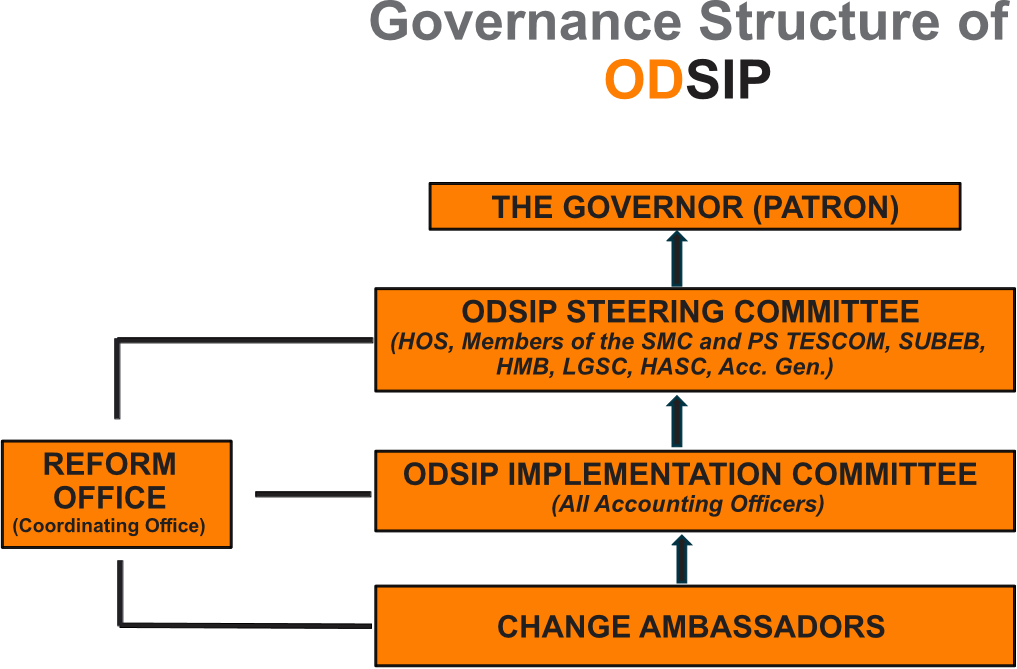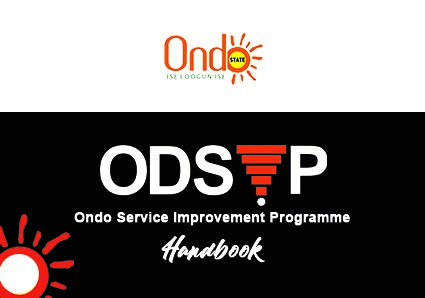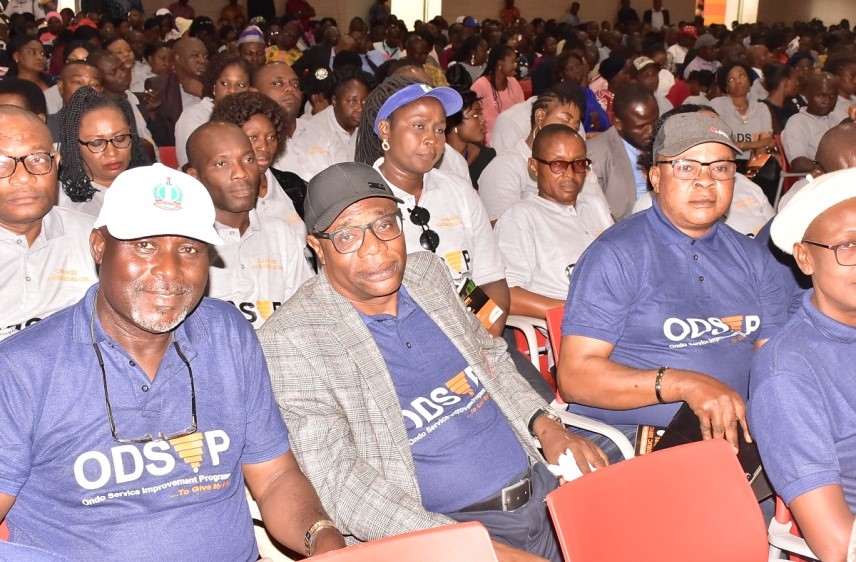ACTIVITIES OF ONDO REFORM OFFICE
COMMENCEMENT OF ODSIP AND INAUGURATION OF CHANGE AMBASSADORS
Ondo Service Improvement Programme (ODSIP) commenced fully on 11th December, 2019 after its launch by Arakunrin Oluwarotimi Akeredolu, Governor of Ondo State. This was followed by the inauguration of over 120 ODSIP Change Ambassadors, by the Head of Service – Mr. Dare Aragbaiye, to drive reform at each MDA level. Series of stakeholders meetings and capacity building programs, for the Reform Ambassadors, have also taken place.
IMPROVEMENT IN THE PROCESSING OF RETIREMENT BENEFITS
The Head of Service quickly set in motion machinery for reducing the rigorous processing of retirement benefits. The exercise, involving all critical stakeholders, saw to the reduction of the check list of documents required for processing retirement benefits by all Public Servants in the State and Local Government levels.
The check list for processing of Retirement/Death benefits for Civil Servants was reduced from 30 to 14, that of the Teaching and non-Teaching retirees was reduced from 32 to 18 while the check list for Local Government and Primary School Retirees was reduced from 33 to 16.
Details of the reform measures were rolled out in the Pension Transitional Department Circular letter Ref. No. PD2/11/105 of 17th October, 2019 on Measures to Ameliorate Problems Associated with Processing of Retirement Benefits.
Some of the other key measures are as follows:
- retiring Officers can also collect forms and the new approved check list of requirements at the various Local Government Area Offices of the State Internal Revenue Service (ODIRS) nearest to them (for State Retiring Officers) and at the 18 Local Government Area Secretariats (for Retiring Primary School Teachers and Local Government Workers)
- all intending retirees would no longer be expected to seek individual clearance from the Local Government Staff Loans Board, Cooperative and Thrift Societies, Micro-Credit Agency, Agric Loan, Housing Loan, Car Loan Departments and other Banks/Finance Houses before processing their documents.
This reform has been widely applauded by workers, while efforts are ongoing to further digitalize the process and make it seamless.
INAUGURATION OF LG CHANGE AGENTS BY LGSC
On the 18th of March, 2020, the Head of Service honoured the invitation of Local Government Service Commission and its workers, by paying them a historic visit. The Head of Service, at the occasion, inaugurated CHANGE AGENTS for all the LG Councils and the LG Staff Training School, making a total of nineteen (19). He also commissioned the LGSC new Clinic and declared it open for use.
CHALLENGES
- Logistics (Office accommodation) which is delaying necessary staffing and full blown operations
- Fixed mindset of workers against change, which is receiving attention


SENSITIZATION BY REFORM OFFICE
- Sensitization visit to Ministry of Lands and Housing
- Sensitization visit to Ministry of Health
- Sensitization visit to Public Service Training Institute (PSTI)
- Sensitization visit to Ministry of Education/ANCOPSS members
- Sensitization visit to ADOFOM Interactive Roundtable Forum
- Sensitization of South-west Reform Coordinating Agencies(RCA) at Community of Practice (COP) meetings
REFORM INITIATIVES BY CHANGE AMBASSADORS IN MDAS
- ODSIP sensitization on first day of the Month at Service Matters, SITA, Min. of Youth and Sports, Ministry of Agriculture, Natural resources, etc.
- ODSIP Sanitation at Ministry of Agriculture, Natural Resources, ADP
- Training for HoA members on Work Ethics and Performance
- “Efiyewa” – a radio sensitization programme by Service Matters Dept. in Yoruba
TRAINING OF ODSIP AMBASSADORS
The State government organised a one-day training programme for Change Ambassadors on select topics which include Growth Mindset, Mandate Mapping and Process Mapping.
The training programme took place at the Public Service Training Institute (PSTI), Ilara-Mokin. It was designed to prepare the Ambassadors for the task ahead. The Head of Service reiterated that the mantra of ODSIP, which is ‘To Give My Best’ should not be a mere routine chant but be made to sink into the hearts of all government workers and reflect in the discharge of their duties.
The Permanent Secretary of the Reform Office, Mr Oluwagbenga Akingbasote advised that government workers should, more than ever before, deliver quality, efficient and effective service to the public, so as to show gratitude for the overwhelming support and motivation received from the state government through regular promotion, payment of salaries and allowances including the arrears owed by the previous administration.





 Head of Service, Mr. ‘Dare Aragbaiye on 1st July 2019, he charged the State Public Service to do everything in its power to keep pace with government in its on-going reform in various sectors in order to deliver dividends of democracy to the people of the State. He admonished that transparency, pro-activeness, resourcefulness and professionalism should be the new outlook of the State Bureaucracy.
Head of Service, Mr. ‘Dare Aragbaiye on 1st July 2019, he charged the State Public Service to do everything in its power to keep pace with government in its on-going reform in various sectors in order to deliver dividends of democracy to the people of the State. He admonished that transparency, pro-activeness, resourcefulness and professionalism should be the new outlook of the State Bureaucracy.
 According to Mr. Aragbaiye, ODSIP is anchored on principle and attitude, and it is therefore timeless. To him, developing a positive disposition to work is simple, practicable and effective, not a matter of huge budget or financial prodding.
According to Mr. Aragbaiye, ODSIP is anchored on principle and attitude, and it is therefore timeless. To him, developing a positive disposition to work is simple, practicable and effective, not a matter of huge budget or financial prodding.


